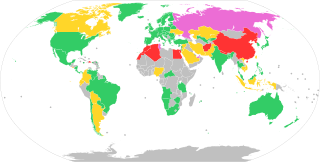A massively multiplayer online role-playing game (MMORPG) is a video game that combines aspects of a role-playing video game and a massively multiplayer online game.
A virtual economy is an emergent economy existing in a virtual world, usually exchanging virtual goods in the context of an online game, particularly in massively multiplayer online games (MMOs). People enter these virtual economies for recreation and entertainment rather than necessity, which means that virtual economies lack the aspects of a real economy that are not considered to be "fun". However, some people do interact with virtual economies for "real" economic benefit.
A capital gains tax (CGT) is a tax on the profit realized on the sale of a non-inventory asset. The most common capital gains are realized from the sale of stocks, bonds, precious metals, real estate, and property.

A financial transaction is an agreement, or communication, carried out between a buyer and a seller to exchange an asset for payment.
Duping refers to the practice of using a bug in a video game to illegitimately create duplicates of unique items or currency in a persistent online game, such as an MMOG. Duping can vastly destabilize a virtual economy or even the gameplay itself, depending on the item duplicated and the rate at which duplication occurs. Modern persistent world games include automated detection of duping. Duping is considered to be a game cheat.
Entropia Universe is a massively multiplayer online (MMORPG) virtual universe designed by the Swedish software company MindArk, based in Gothenburg.
Virtual crime or in-game crime refers to a virtual criminal act that takes place in a massively multiplayer online game (MMOG), usually an MMORPG. The huge time and effort invested into such games can lead online "crime" to spill over into real world crime, and even blur the distinctions between the two. Some countries have introduced special police investigation units to cover such "virtual crimes". South Korea is one such country and looked into 22,000 cases in the first six months of 2003.
Gold farming is the practice of playing a massively multiplayer online game (MMO) to acquire in-game currency, later selling it for real-world money.
Gold sink is an economic process by which a video game's ingame currency ('gold'), or any item that can be valued against it, is removed. This process is comparable to financial repression in real economies. Most commonly the genres are role-playing game or massively multiplayer online game. The term is comparable to timesink, but usually used in reference to game design and balance, commonly to reduce inflation when commodities and wealth are continuously fed to players through sources such as Gold taps; such as quests, looting monsters, or minigames.
Virtual currency, or virtual money, is a type of unregulated digital currency, which is issued and usually controlled by its developers and used and accepted among the members of a specific virtual community. In 2014, the European Banking Authority defined virtual currency as "a digital representation of value that is neither issued by a central bank or a public authority, nor necessarily attached to a fiat currency, but is accepted by natural or legal persons as a means of payment and can be transferred, stored or traded electronically". By contrast, a digital currency that is issued by a central bank is defined as "central bank digital currency".
In neoclassical economics, a market distortion is any event in which a market reaches a market clearing price for an item that is substantially different from the price that a market would achieve while operating under conditions of perfect competition and state enforcement of legal contracts and the ownership of private property. A distortion is "any departure from the ideal of perfect competition that therefore interferes with economic agents maximizing social welfare when they maximize their own". A proportional wage-income tax, for instance, is distortionary, whereas a lump-sum tax is not. In a competitive equilibrium, a proportional wage income tax discourages work.
Microtransactions, often abbreviated as MTX, are a business model where users can purchase virtual goods with micropayments. Microtransactions are often used in free-to-play games to provide a revenue source for the developers. While microtransactions are a staple of the mobile app market, they are also seen on PC software such as Valve's Steam digital distribution platform, as well as console gaming.
The virtual world Second Life has its own economy and a virtual token referred to as Linden Dollars (L$). In the SL economy, users buy from and sell to one another directly, using the Linden, which is a closed-loop virtual token for use only within the Second Life platform. Linden Dollars have no monetary value and are not redeemable for monetary value from Linden Lab. A resident with a surplus of Linden Dollars earned via a Second Life business or experiential play can offer to exchange with other users via the LindeX exchange provided by Linden Lab. This economy is independent of the price of the game, which users pay to Linden Lab, not to each other. Linden Lab reports that the Second Life economy generated US$3,596,674 in economic activity during the month of September 2005, and as of September 2006 Second Life was reported to have a GDP of US$64,000,000.
Virtual goods are non-physical objects and money purchased for use in online communities or online games. Digital goods, on the other hand, may be a broader category including digital books, music, and movies. Virtual goods are intangible by definition.

PlayerAuctions is a digital marketplace that connects buyers and sellers of various types of gaming genre such as Massively multiplayer online game (MMO) games, First-person shooters (FPS), Multiplayer online battle arena (MOBA), Mobile game, survival games, battle royale game etc. so they can buy and sell digital assets. These include in-game currency, items, skins, accounts, power leveling and boosting services, and CD keys for games and applications. The site is a neutral marketplace that supports player-to-player trading for popular online games such as RuneScape, Old School RuneScape, World of Warcraft, CSGO, PUBG, Path of Exile, League of Legends, Fortnite, Overwatch, GTA V, Warframe, Pokémon Go, Clash of Clans, EverQuest, ArcheAge, Final Fantasy XIV, Apex Legends, Elder Scrolls Online, Habbo, and over 250 other games.
GamePal is an online platform for players of massively multiplayer online (MMO) games to buy, sell and trade digital assets such as in-game currency, items, accounts, and power leveling services. The site is a neutral marketplace that supports player-to-player as well as direct selling for popular MMOs.

A cryptocurrency, crypto-currency, or crypto is a digital asset designed to work as a medium of exchange wherein individual coin ownership records are stored in a ledger existing in a form of a computerized database using strong cryptography to secure transaction records, to control the creation of additional coins, and to verify the transfer of coin ownership. Cryptocurrency does not exist in physical form and is typically not issued by a central authority. Cryptocurrencies typically use decentralized control as opposed to a central bank digital currency (CBDC). When a cryptocurrency is minted or created prior to issuance or issued by a single issuer, it is generally considered centralized. When implemented with decentralized control, each cryptocurrency works through distributed ledger technology, typically a blockchain, that serves as a public financial transaction database.

The legal status of bitcoin varies substantially from state to state and is still undefined or changing in many of them. Whereas the majority of countries do not make the usage of bitcoin itself illegal, its status as money varies, with differing regulatory implications.
United States virtual currency law is financial regulation as applied to transactions in virtual currency in the U.S. The Commodity Futures Trading Commission has regulated and may continue to regulate virtual currencies as commodities. The Securities and Exchange Commission also requires registration of any virtual currency traded in the U.S. if it is classified as a security and of any trading platform that meets its definition of an exchange.




